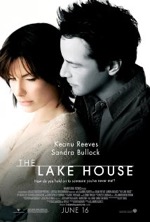The Lake House (PG)

Starring: Keanu Reeves
June 2006
“Timeless Romance with ‘Speed’ Stars”
This type of movie has been done before, most notably in Frequency (2000), which starred Dennis Quaid and a pre-Jesus Jim Chaviezel as father and son separated by time but able to communicate via a HAM radio, which receives an ethereal signal boost from unusual solar flare activity in both time periods. At one point in that movie, Quaid, living thirty years in the past, places a wallet in a Ziploc bag and hides it under a loose floorboard, telling his grownup son in the future where to find it. Chaviezel immediately retrieves the wallet and uses it as a clue to track down a serial killer.
Mailing across time is taken to a whole new level in The Lake House, director Alejandro Agresti’s temporal romance starring Speed duo, Sandra Bullock and Keanu Reaves. Kate Forrester (Bullock) is a doctor at a large Chicago hospital; seeking refuge from the frenetic pace of city life, Kate moves into a lake house on the north shore. Once settled in, Kate finds a forwarding note from the previous tenant, Alex Wyler (Reaves), inside the mailbox (which becomes the focal point of the movie and the conduit through which the characters communicate with each other). Mistaking the note as a prank, Kate writes a response to Alex, sets the letter inside the mailbox and raises the flag. As soon as Kate turns to go, the flag drops. Inside the mail box is another message from Alex, ardently claiming veracity on his part and belying any notion of a practical joke. As Kate and Alex continue exchanging notes over the next few days, they make an astonishing discovery—though Kate and Alex inhabit the same physical space, they exist in two different times. Kate lives in the present day (2006), but Alex is writing her from 2004.
Though the movie’s plot is a little too convoluted at times, it’s a tight yarn with an interesting character study, particularly in Kate’s case. At some point, Kate realizes she’s falling for a man she can never have; a bitter reality that exemplifies her life and ongoing struggle to find fulfillment. One of the finest scenes in the movie is when Alex takes Kate on a virtual walk with the assistance of a map and prerecorded cassette tape; Alex’ commentary is conveyed in a series of voice-overs, and, as an architect, he describes some of Chicago’s landmark buildings in great detail. It’s a touching moment, but when complications surmount and a relationship with Alex seems more and more impossible, Kate severs all communication with Alex. Kate concludes that Alex was “just a beautiful fantasy where time stood still,” and decides to move on by letting go of the past.
The movie’s unconventional resolution caps off a moving, thought-provoking love story that succeeds by placing emphasis on plot and character and not on a contrived or commonplace romance…the fact that the leads barely encounter each other aids the movie in subtle yet powerful ways, producing yearning in the characters as well as the audience. Some mysteries remain unexplained, however; such as how the couple can communicate in the first place. It may seem coincidental that both Kate and Alex have the same pet, a female dog oddly named Jack, but I believe the canine is the key to their ability to communicate with each other across time. Jack barks and runs away when Alex’ friend, Mona, makes a pass at him and the dog leads Alex to Kate’s birthday party where couple first meet. At times, the dog almost seems sentient. Could it be that Jack (an alien or supernatural being in disguise) is orchestrating events to bring the lovelorn couple together? It’s as good an explanation as any, I suppose.
Though the pacing is slow at times, the movie has great atmosphere—Agresti makes excellent use of the breathtaking lake house set, built, according to the story, by Alex’ absentee father, Simon (Christopher Plummer). Simon’s discourse on the proper use of light in architecture is memorable, though not necessarily crucial to the story. As for Bullock and Reaves, their acting isn’t memorable in the least, but that’s exactly what the script requires…less-nuanced performances would have overpowered the plot and distracted the audience from what turns out to be a first-rate love story, garnished with a sprig of suspense and seasoned with a sci-fi paradox.
Jane Austen’s Persuasion is referenced on several occasions in the movie and that novel’s themes of waiting for the right time and receiving a second chance find modern expression in The Lake House.
So the next time you go outside to mail a letter, if your mailbox flag suddenly drops after you raise it, it’s probably just a loose screw, the pull of gravity or a stiff breeze. But just in case, check it anyway.
Rating: 3